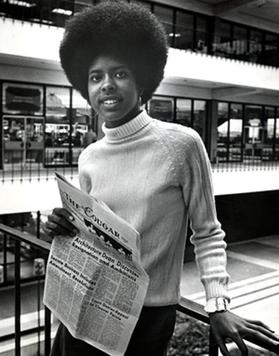Lynn Eusan facts for kids
Quick facts for kids
Lynn Cecilia Eusan
|
|
|---|---|

Lynn in November of 1968
|
|
| Born | October 11, 1948 |
| Died | September 10, 1971 (aged 22) |
| Occupation | Journalist |
| Known for | First black Homecoming queen at UH |
Lynn Cecilia Eusan was a remarkable student and activist. She made history as the first Black Homecoming queen at the University of Houston. She was also the first Black woman to earn this title at any mostly white college or university in the Southern United States. Today, a park at the university is named in her honor.
Contents
Early Life
Lynn Eusan was born on October 11, 1948, in Galveston County, Texas. Her parents, Ida Mae and Wilbur Eusan, worked hard to support their family. Lynn and her four brothers and sisters grew up in San Antonio, Texas.
She finished high school at Phillis Wheatley High School in 1966. Right after, she started college at the University of Houston.
Making a Difference at the University of Houston
At the University of Houston, Lynn was very active. She played in the Spirit of Houston marching band. She also worked as a reporter and photographer for the school newspaper. Lynn studied both education and journalism.
She helped start a group called the Committee on Better Race Relations (COBRR). This group wanted to "promote racial harmony" among students. A year later, Lynn co-founded African Americans for Black Liberation (AABL). This new group worked to bring together different races and communities. They also raised money for scholarships and created summer programs for young Black people.
Lynn was also a founding member of the Epsilon Lamba chapter of Alpha Kappa Alpha. This was the first Black sorority at the university. She also helped create the SHAPE (Self Help for African People through Education) Community Center. This center helped people in the Third Ward neighborhood.
Becoming Homecoming Queen
On November 22, 1968, Lynn Eusan was crowned the University of Houston's Homecoming queen. She won against five other students. This made her the first Black homecoming queen at a white university in the South. The African Americans for Black Liberation group helped run her campaign. The student newspaper, The Daily Cougar, also supported her. As Homecoming queen, Lynn continued to speak up for civil rights and Black pride.
Leading up to the Homecoming game, Lynn faced some challenges. Some people were not supportive of her. But Lynn stayed positive. She told the Houston Chronicle that this was the first time Black students had worked together so effectively.
Standing Up for Change
In February 1969, Lynn and about 100 members of the AABL marched to the university president's office. They presented a list of 10 requests. These requests included:
- Starting an African-American studies program
- Hiring more Black teachers and staff
- Working to get more Black students to join and stay at the university
- Fair pay and better working conditions for all workers
- Support for programs that helped young people in the city
The president agreed to some of the group's requests. That same year, the university started the African-American studies program that AABL had asked for.
Lynn was also involved in protests for important causes. She was arrested twice during demonstrations. In 1969, she was part of a protest on campus, but the charges were later dropped. In 1967, she was arrested during a protest for better conditions for children in the Sunnyside neighborhood.
Legacy
Lynn Eusan passed away in 1971. She was buried in the African American Cemetery in San Antonio. A public memorial service was held at the University of Houston.
The sorority Lynn helped start, Alpha Kappa Alpha, is still active at the university today.
The SHAPE Community Center, which Lynn co-founded, is also still helping the community. It has helped people vote and organizes an annual cultural festival.
Three years after Lynn's death, the University of Houston named a park after her. It is called the Lynn Eusan Park. This park is now a popular spot for students to gather and enjoy activities. In 2013, the university built a modern stage in the park with lights and a sound system.
 | Selma Burke |
 | Pauline Powell Burns |
 | Frederick J. Brown |
 | Robert Blackburn |

